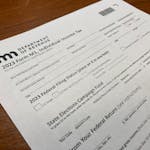There was no shortage of risky bank loans that turned bad in the wake of the Great Recession. But the failed $28.5 million loan from a group of banks to boy band creator Lou Pearlman will surely go down as one of the state's more unusual.
Now, the banking drama comes to a close -- and on a surprising note. Late Thursday, a federal jury in Minneapolis concluded that a South Carolina bank helped the music mogul defraud his lenders, awarding $16 million to 26 banks, many in Minnesota.
John Skopinski, chief credit officer at American Bank of St. Paul, said the decision is justice that was "a long time coming."
Pearlman was the mogul behind the musical acts Backstreet Boys and 'N Sync. He's serving a 25-year sentence in Texas after pleading guilty to running a Ponzi scheme and bilking banks and investors out of $300 million or more. But in 2006, he still looked to most like a successful business tycoon, with a fleet of aircraft in addition to his various music and entertainment ventures.
The group of mostly smaller, community banks agreed to lend $28.5 million to Pearlman, presumably to finance an American version of a British TV show called "Top of the Pops."
American Bank sank $5 million into the loan and was the lead bank in the loan package. For many of the banks, including a dozen in Minnesota and others in Montana, Maine and Illinois, the loan losses were a significant financial blow.
Skopinski, who didn't work for American Bank when the loan was made, acknowledged it was "not your typical Minnesota loan." He got word of the judgment Friday morning in an e-mail. "We feel very, very good," he said.
Eric Nystrom, American Bank's attorney at Lindquist & Vennum, which handled the case, said it's extremely unusual for a bank to be found liable for aiding and abetting a convicted fraudster. "It really is just stunning, when you sit back and think about it," Nystrom said.
Michael Carlson, a partner at Faegre & Benson's finance and restructuring group, agreed. "I won't say it's unprecedented, but it's extraordinarily unusual simply because banks are regulated entities and examiners are routinely in the bank looking for violations," he said.
Mercantile Bank of Greenville, S.C., argued that it knew nothing of the fraud and that it was a victim of Pearlman's deception like everyone else.
Pearlman defaulted on the loan fairly quickly, as his business operation unraveled. He was arrested in Indonesia in 2007 after fleeing authorities. American Bank sued him that year, but Pearlman's operation filed for bankruptcy, and he turned out to have empty pockets.
American Bank sued the Twin Cities loan brokerage that shopped the Pearlman deal to various banks: North American Capital Markets and its executives Stuart Harrington and Craig Mueller. But North American, based in Golden Valley, filed for Chapter 7 voluntary bankruptcy in 2009. Craig Mueller, too, filed for bankruptcy last year. Harrington couldn't be located, Nystrom said.
American Bank then turned its scope on Mercantile Bank. The Greenville, S.C.-based bank operated widely in Florida and did business with Pearlman in Orlando, his home base. In 2005, Pearlman had defaulted on a $6 million line of credit from Mercantile; the bank was trying to restructure it.
The solution, American Bank argued in court, was to refinance Pearlman's Mercantile debt into an entirely new loan. Thus was born the $28.5 million loan that sucked so many community banks into Pearlman's operation. Mercantile was the final participant in the American Bank loan, but was quickly paid off -- the only bank to get its money back, Nystrom said.
Mercantile Bank had extensive knowledge about Pearlman's fraud, American Bank argued, including the fact that the two accountants who prepared Pearlman's financial records were fictitious.
The jury trial started Nov. 7. The most prominent and damning evidence, Nystrom said, was an e-mail from one Mercantile employee to another saying that a loan analyst had figured out that Pearlman's accountants did not exist and that they had asked Pearlman to exit the bank.
The 12-member jury didn't award any punitive damages. Mercantile has since been bought by TD Bank Financial Group in Canada.
While the Pearlman loan looks like a travesty in hindsight, it made sense at the time when participation loans were hot in community banking, Nystrom said. The banks knew and trusted North American Capital Markets, which was marketing the loan. A handful of the banks in the deal had lent Pearlman money before, and he had paid up.
And for many of the rural banks, the deal was a welcome opportunity to diversify away from farm loans, something they were under pressure from regulators to do.
"They were presented with financial statements and tax returns and things they thought were prepared by CPAs," Nystrom said.
Jennifer Bjorhus • 612-673-4683




